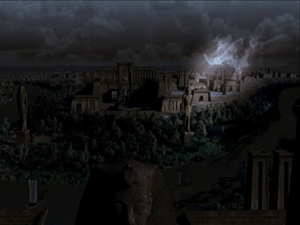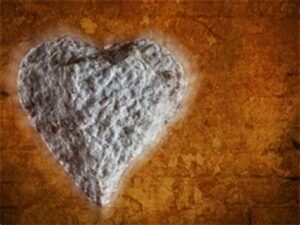Moses Stretched Out His Hand Toward the Sky
and Total Darkness Covered All Egypt for Three Days
10: 21-29
Moses stretched out his hand toward the sky and total darkness covered all Egypt for three days DIG: Do you think withholding the Israelites from a three-day festival to God was punished – measure for measure – by three days of darkness in Egypt? What festival followed? What effect would three days of darkness have on the Egyptians? On the Israelites? Explain why God granted favor to the Israelites so the Egyptians would give up their riches.
REFLECT: Against which gods of your culture have you seen God display His power? How does this compare to His use of the plagues? What does this say about the Lord’s desire for you?
The ninth plague came without any warning, just like the third and sixth plagues, so it formed a fitting climax to the third cycle of plagues. Then ADONAI said to Moses, His servant: Stretch out your hand toward the sky so that darkness will spread over Egypt – darkness that can be felt (10:21). Although Scripture here does not make mention of a staff in Moses’ hand, it is reasonable to assume that he produced the plague by means of it. The last three plagues produced increasing degrees of darkness, and here was the deepest darkness yet because this was not just darkness devoid of any light, it was something deeper than that. It was a spiritual darkness.
The plague of darkness was an attack against the most powerful god in the Egyptian Pantheon, that of Amon-Ra, the sun god. The Egyptians believed that he was the source of heat and light, warming and energizing the people. He was the national god of Egypt, and part of a very important triad of deities including his wife Nut, the sky goddess, and their son Khons. With this plague, major gods related to the sun like Ptah (creator of the sun, moon and earth), Atum (a sun god worshiped in Heliopolis), and Toth (the moon god) were silenced, as well as other minor gods like Tem, god of the sunset, and Shu, god of sunlight and air. Thus, this plague was yet another insult to Egypt’s religion and culture. It displayed the Lord’s sovereignty and plunged Egypt into a horrible darkness that could be felt.
There is an interesting introversion here with the second plague. Here there was an actual darkness, whereas the second plague had to do with frogs, or creatures of the night.

So Moses stretched out his hand toward the sky, and total darkness covered all Egypt for three days. The rabbis teach that the darkness was not caused by the sun ceasing to shine, but was due to a thick fog which settled over Egypt. No one could see anyone else or leave his place for three days (10:22-23a). The first day may have been explained away, but by the third day the Egyptians certainly had to be in great fear. Their cries were surely would have been heard throughout the land. One wonders what the prestige of Pharaoh must have been like at this point. Among the divine attributes of Pharaoh was the fact the he was supposed to be the Amon-Ra in the flesh “. . . by whose beams one sees, he is the one who illuminates Egypt more than the sun itself.”179
During the end times, including the last days of the Church Age, as well as the Tribulation, the Scriptures speak of five blackouts that will occur (see my commentary on Revelation, to see link click Cq – The Sixth Seal: The Sun Turned Black Like Sackcloth). The first of these is clearly prophesied to occur before the Tribulation: The sun will be turned to darkness and the moon to blood before the coming of the great and dreadful day of the Lord (Joel 2:31). A blackout means that the light of the sun, moon and stars is suddenly blacked out so that the earth is not receiving any light form these sources and is in total darkness. Those five blackouts in the last days will be similar to the plague of darkness that covered all Egypt for three days.
It is plain to see that God is light and the darkness is the withdrawal of that light: God is light; in Him there is no darkness at all (First John 1:5b). Therefore, this judgment of darkness clearly showed that God had abandoned Egypt. Nothing remained but death itself. But just as there was a supernatural darkness, there was a supernatural light. Yet all the Israelites had the light of the Sh’khinah glory in the places where they lived (10:23b). The Egyptians had darkness they could not light up and Israel had light that they could not put out. It is the same today. We are children of the light (Ephesians 5:8), and do not belong to the night or to the darkness (First Thessalonians 5:5b), because God, who said, “Let light shine out of darkness,” made His light to shine in our hearts to give us the light of the knowledge of the glory of God in the face of Christ Jesus (Second Corinthians 4:6). But the way of the wicked is deep darkness; they do not know what makes them stumble (Proverbs 4:19), and this is because they are without hope and without God in the world (Eph 2:12b).
Once again Moses and Aaron were called before Pharaoh, this time in a desperate effort to preserve his prestige. Pharaoh’s fourth and last compromise was yet another ploy to get the Hebrews to return. He didn’t need their animals, but he knew the Israelites did. He wanted some kind of security so that the people would have to return.180 After the three days of darkness, Pharaoh summoned Moses and said: Go, worship ADONAI. Even your women and children may go with you; only leave your flocks and herds behind (10:24).
But Moses boldly cautioned: You must allow us to have sacrifices and burnt offerings to present to ADONAI our God (10:25). Our livestock, too, must go with us, not a hoof is to be left behind. We have to use some of them in worshiping ADONAI, and until we get there we will not know what animals we are to use to worship God (10:26). Moses’ courage in not giving an inch was magnificent. He said they would not leave a hoof in Egypt. They would need to worship God with their resources, so they had to take all of their belongings and dedicate them to God. Such worship would involve animal sacrifice.181

But ADONAI hardened Pharaoh’s heart, and he was not willing to let them go (10:27). God has many reasons for doing what He does. One reason for the plagues was to make Pharaoh reveal that he was a godless man. ADONAI could have taken the children of Isra’el out of Egypt immediately without any contact with Pharaoh. If He had done so, the critic would say that God certainly was not fair to Pharaoh, that He should have given him an opportunity for salvation. Well, that is exactly what God did. God also wanted to demonstrate to His people what He was able to do before He took them into the wilderness. He wanted them to be absolutely sure that He was able to bring them into the Land of Abraham, Isaac, and Jacob. That story has been told through the observance of the Passover for about four thousand years.182
As God deals with each of us, one of two things always happens. Either our pride and self-will is broken down and brings us to complete humility and submission to His Lordship, or the human heart rebels against God and becomes a heart of stone, calloused against God. If such a one does not repent, they are in danger of becoming reprobate, beyond God’s salvation. Not because God cannot or would not save them, but because they love their sin more than Him. Therefore, God gives them over to a depraved mind, to do what ought not to be done (Romans 1:18-28). We can say no to God and make it stick, and that was the case with Amenhotep II.
Perhaps Pharaoh thought that his compromise was very reasonable and may have fully expected that Moses would agree to it. But when he did not, the king flew into a great rage and yelled uncontrollably: Moses, “Get out of my sight!” Make sure you do not appear before me again because the day you see my face you will die” (10:28)! He was really angry at the time, but that was just another hollow threat because they would meet once more, only for the king to cave in to Moses’ demand to let the people go (12:31-32). Measure for measure, Pharaoh would reap what he had sown. Egypt would lose both its firstborn sons and its firstborn cattle. Experience tells us that the wicked do not repent, even on the threshold of destruction.183
“Just as you say,” Moses replied, “I will never appear before you again” (10:29). ADONAI had probably revealed the plague of the firstborn and its timing to Moses, so before he left Pharaoh’s presence he warned him, saying: All these officials of yours will come to me (after their firstborn sons were dead), bowing down before me saying: Go, you and all the people who follow you! After that I will leave Egypt. Then Moses, hot with righteous anger, left Pharaoh, seemingly for the last time.
This plague was also the forerunner of a catastrophe that appears in the book of Revelation (see the commentary on the book of Revelation Ef – The Fifth Angel Poured Out His Bowl on the Throne of the Antichrist, Plunging His Kingdom into Darkness). The physical pain that the ungodly will suffer underscores the horror experienced in the final plague during the Great Tribulation. The plague of darkness in Exodus was terrible, but the fifth bowl of judgment in Revelation will be overwhelming.



Leave A Comment